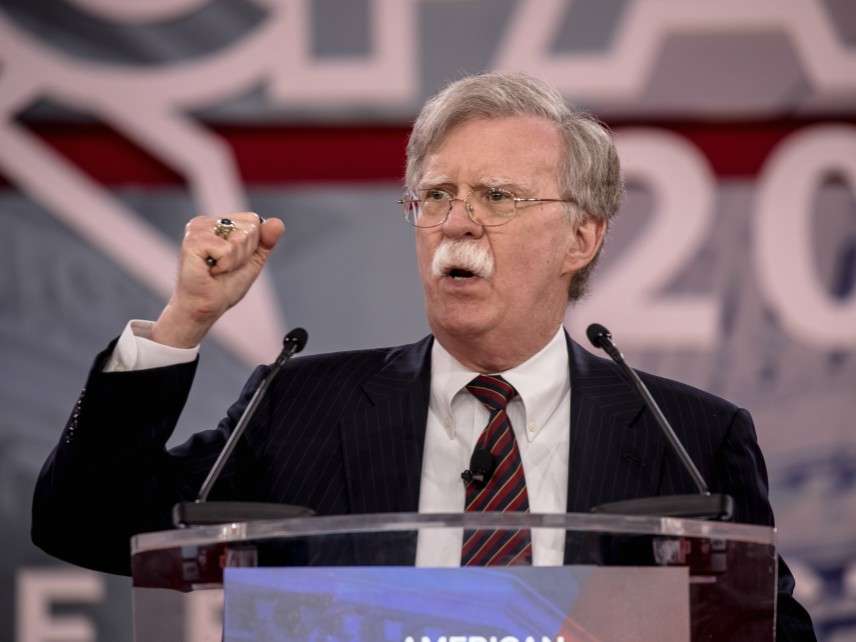5 Things About John Bolton That Are Worse Than His Mustache
The new national security adviser embodies the reckless interventionism that Trump criticized during his campaign.

Donald Trump reportedly hesitated to appoint John Bolton as his national security adviser because he was put off by the former U.N. ambassador's walrus mustache. While this is one of the few areas where I see eye to eye with the president, there may be more substantive reasons to think twice about taking advice from Bolton, who never met a war he did not like and represents precisely the sort of reckless interventionism that Trump criticized during his campaign. Here are five things about John Bolton that are worse than his facial hair:
1. Bolton supported the 2002 invasion of Iraq and still thinks it was a dandy idea. As undersecretary of state for arms control and international security affairs, Bolton was largely responsible for the deception used to justify the invasion of Iraq, a stratagem that Trump has condemned in no uncertain terms. "They lied," Trump said during a presidential debate in February 2016. "They said there were weapons of mass destruction. There were none, and they knew there were none." Bolton is not only a liar, according to Trump, but a liar who does not learn from his big, fat mistakes. "I still think the decision to overthrow Saddam was correct," he told The Washington Examiner in 2015.
2. Bolton supported the U.S. intervention in the Libyan civil war. In 2011, while seeking the Republican presidential nomination, Bolton called for the assassination of Libyan strongman Moammar Gadhafi, saying he was "a legitimate military target." While Trump initially favored ousting Gadhafi, he later described it as a mistake that, like the Iraq war, created chaotic conditions conducive to terrorism. "Each of these actions [has] helped to throw the region into chaos and [given] ISIS the space it needs to grow and prosper," Trump said in an April 2016 speech. "It all began with the dangerous idea that we could make Western democracies out of countries that had no experience or interest in becoming a Western democracy."
3. Bolton thinks the U.S. should have intervened in the Syrian civil war sooner and more aggressively. "Whatever slim chance there was of empowering a 'moderate' anti-Assad opposition when the civil war began four years ago disappeared while Mr. Obama dithered," he wrote in 2015. As a presidential candidate, Trump counted U.S. meddling in Syria as one of the actions that "helped to throw the region into chaos," although since taking office he has taken a somewhat different view.
4. Bolton agitated for war with Iran. "Iran will not negotiate away its nuclear program," he wrote in 2015. "Nor will sanctions block its building a broad and deep weapons infrastructure. The inconvenient truth is that only military action…can accomplish what is required. Time is terribly short, but a strike can still succeed."
5. Bolton favors attacking North Korea. While Trump recently agreed to a meeting with North Korean leader Kim Jong-un in the hope of negotiating denuclearization, Bolton (as always) favors a more aggressive approach. In a Wall Street Journal op-ed piece last year, he laid out three "military options," including a pre-emptive strike on "Pyongyang's known nuclear facilities, ballistic-missile factories and launch sites, and submarine bases."
Trump has never been a consistent skeptic of unnecessary wars. Since taking office, he has warmed to war in Syria and Afghanistan. And even when he was highlighting the unintended effects of past interventions, he bragged that he was "a very militaristic person" and promised more money for armed forces he said were already doing too much. The omnibus spending bill that Congress approved this week delivers on that promise with $700 billion in military spending for the current fiscal year, including what the Senate Appropriations Subcommittee on Defense touts as "the biggest year-to-year increase in defense funding in 15 years."
Even before that increase, the U.S. had a larger military budget than the next eight biggest spenders combined. Throwing even more money at the Pentagon hardly seems consistent with Trump's complaint that "we're all over the place, fighting in areas that we just shouldn't be fighting in." An outsized military budget invites outsized thinking about how to use it, and an adviser like Bolton will have plenty of ideas.


Show Comments (72)